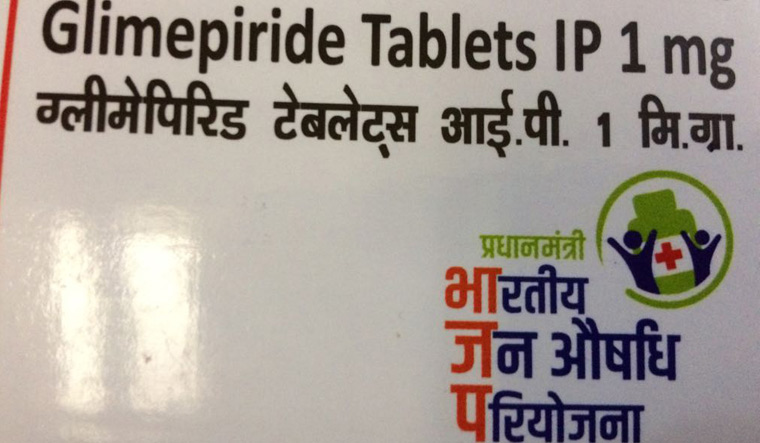Labels of drugs sold at the government's fair price shops are being misused for the promotion of a particular political party, a section of health activists said. These are generic medicines being sold at Jan Aushadhi Kendras (fair price shops), under the Centre's Pradhan Mantri Bhartiya Janaushadhi Pariyojana (PMBJP).
Under this scheme, stores selling affordable generic medicines can be run by NGOs, charitable institutes, private hospitals, registered professional organisations, or self-help groups.
Activists said by highlighting the three letters of the name of the scheme— B, J and P—in saffron colour, on the labels of drugs being sold at these shops, as well the website of the scheme, the government is misusing products distributed through a public-funded scheme to highlight the name of the political party—BJP. “This represents a gross misuse of public funds and is a willful disregard of Supreme Court's directions on government advertisements,” activists from Jan Swasthya Abhiyan (JSA) and the All India Drug Action Network (AIDAN) said in a statement.
The Jan Aushadhi scheme was launched in November 2008 by the ministry of chemicals and fertilisers, to make available quality medicines at affordable prices. However, in 2015, the scheme was renamed by the NDA government to Pradhan Mantri Jan Aushadhi Yojana. “Subsequently, the name was changed to Pradhan Mantri Bhartiya Janaushadhi Pariyojana by inserting ‘Bharatiya’, and by changing ‘Yojana’ to ‘Pariyojana. This is a blatant attempt to insert the acronym ‘BJP’ into the name of the scheme,” according to the statement.
“While the government can legitimately issue advertisements to convey information about welfare schemes, it is both unethical and illegal to carry advertisements—at public expense—about government schemes that seek to project a particular political party. Such an act, involving use of public money for political advantage, is a violation of Articles 14 and 21 of the Constitution of India,” activists said.
The scheme is an important one for the Centre, and was much discussed after Prime Minister Narendra Modi said the country would have a law to ensure that doctors would prescribe affordable generic medicines. A month after Modi made the announcement, Union Chemicals and Fertiliser and Parliamentary Affairs Minister Ananth Kumar said the country would have more than 3,000 Jan Aushadhi Kendras by end of the year, up from the existing 1,300 stores.
However, activists from JSA and AIDAN network pointed out that the scheme had been falling short of providing relief to poor patients because of spiraling drug prices. “While there are over six lakh chemist outlets in the country, only a little over 3,000 outlets have been rolled out under the scheme. This represents just 0.5 per cent of chemist outlets in the country. Reports also suggest that many of the outlets under the scheme face serious stockouts of important medicines. It would have been far more desirable if more energy had been expended in strengthening the scheme rather than in finding ways to make the scheme a part of the propaganda campaign of a particular political party,” they said in the statement.
Last August, a study published in the Journal of Pharmacology and Pharmacotherapeutics had also identified several factors such as issues with the supply chain of generic medicines, lack of awareness among consumers, and doctors not prescribing generic medicines as the reason behind the scheme's failure.
Activists urged the government to “immediately revert to the earlier nomenclature of the Jan Aushadhi Scheme, recall the drug labels highlighting the name of BJP, reissue them without highlighting the name of a political party, and also to change the scheme’s logo on the website”. They also urged the government to take appropriate steps to strengthen the Jan Aushadhi scheme, so that real benefits accrue to a much larger number of patients.


